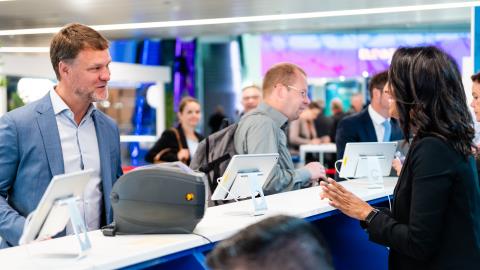For this year’s EBAday Challenge Speech, Claudia Olsson, CEO and founder of Stellar Capacity and a Young Global Leader at the World Economic Forum, offered insightful perspectives on the profound influence of technology on society, individual behavior, and leadership dynamics.
Olsson pointed out that while technological advancements are rapidly progressing, organizational leadership and problem-solving strategies have not evolved in tandem. This disconnect has hindered the payments and transaction banking sector from fully capitalizing on the opportunities presented by digital transformation.
Using the example of George Hotz, a renowned hacker known for his innovative work in developing iOS jailbreaks and self-driving car technologies, Olsson emphasized that Hotz exemplifies how a single individual can disrupt an entire industry through open-sourced innovation.
She also referenced the United Nations, which was founded over 70 years ago, highlighting that its structures remain inadequately aligned with advancements in cloud computing, artificial intelligence, and generative AI. Olsson advocated for rethinking our current global infrastructure, decision-making processes, and collective strategies to harness emerging opportunities.
With the world more interconnected than ever, innovation is poised to proliferate alongside the increasing number of people gaining online access. Citing Metcalfe’s Law, which notes that the value of a network increases with the addition of users, she underscored the importance of connectivity in driving innovation.
Olsson further pointed out that as more nodes connect to the global network, the momentum of innovation will continue to accelerate. She also referred to Moore’s Law, which observes that computing power doubles approximately every two years, indicating we are on the verge of even more rapid advancements, potentially expedited by quantum computing.
The conversation turned toward the implications of generative AI in resolving complex issues and creating synthetic data for strategic purposes. Olsson noted that approximately 80 million individuals are employed in Europe’s knowledge economy, and a significant portion of their tasks may eventually be automated by generative AI, leading to both job displacement and entrepreneurial opportunities. However, before such transformations occur, it’s vital to address existing biases within these systems.
According to a 2020 LinkedIn Learning report, the most sought-after soft skills include creativity, persuasion, collaboration, adaptability, and emotional intelligence. In contrast, the top hard skills in demand are blockchain technology, cloud computing, analytical reasoning, artificial intelligence, and user experience design.
The World Economic Forum also identified a shift in essential skills over the years. For instance, the top skills expected to be imperative by 2025 will include analytical thinking, active learning, complex problem-solving, and technological proficiency.
In conclusion, Olsson stressed that as we move forward, organizations must adapt their strategies to keep pace with technological advancements and evolving societal needs to remain relevant in this rapidly changing landscape.
